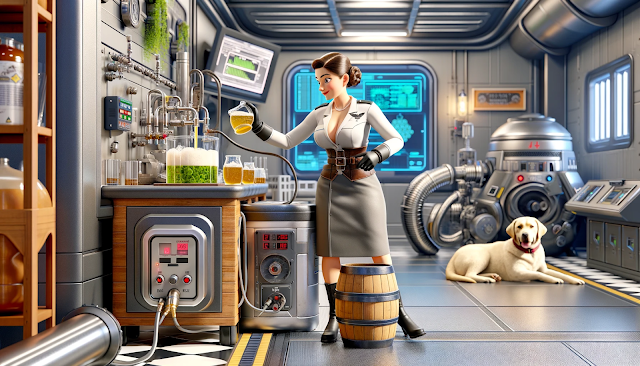Water is often overlooked but is one of the most critical components of brewing. Great brewers pay meticulous attention to water chemistry, adjusting it to match the style they're brewing. The mineral composition of water can profoundly influence the taste and mouthfeel of your beer.
Exceptional beer begins with exceptional ingredients. Top-tier malt, fresh hops, and carefully selected yeast strains are the building blocks of great brews. Skimping on ingredients can compromise the quality and flavor of your beer, so investing in high-quality ingredients is a non-negotiable for brewers aiming for greatness.
Maintaining precise temperature control during brewing and fermentation is a cornerstone of producing excellent beer. Different styles require specific temperature ranges to bring out their best characteristics. Whether it's mashing, boiling, or fermentation, controlling temperature ensures consistent and desired results.

Great beer cannot be rushed. Aging and conditioning are often overlooked but are critical stages in the brewing process. Allowing your beer to mature in the right conditions can result in smoother, more refined flavors that are well worth the wait.
Cleanliness and sanitation are paramount in brewing. Even the tiniest trace of unwanted microorganisms can spoil your beer. Great brewers maintain a rigorous cleaning regimen to ensure their equipment and environment are pristine.
Exceptional brewers are not afraid to push the boundaries of tradition. They embrace experimentation and innovation, constantly exploring new techniques, ingredients, and styles. It's through experimentation that some of the most remarkable and unique beers have been created.
Taste, Taste, Taste!
Tasting and evaluating your beer at every stage of the process is a crucial practice. Developing your palate and honing your ability to discern flavors and aromas will help you make informed decisions about your brew's progress and adjustments needed.
Great brewers often collaborate with others in the brewing community. Sharing knowledge and experiences, seeking feedback, and learning from others can be incredibly enriching. Collaboration often leads to new insights and exciting brewing adventures.
Keeping meticulous records of your brewing process is essential for continuous improvement. Detailed notes on ingredients, temperatures, and observations help you learn from your successes and mistakes, paving the way for even better batches in the future.
Brewing exceptional beer is a lifelong pursuit, and these tips and tricks are just the beginning of your journey. So, whether you're a seasoned brewmaster or a passionate homebrewer, embrace these secrets and strategies as you strive to create beers that are not just good but truly exceptional. Let's raise a glass to the endless possibilities that await in the world of brewing!
Exceptional beer begins with exceptional ingredients. Top-tier malt, fresh hops, and carefully selected yeast strains are the building blocks of great brews. Skimping on ingredients can compromise the quality and flavor of your beer, so investing in high-quality ingredients is a non-negotiable for brewers aiming for greatness.
Maintaining precise temperature control during brewing and fermentation is a cornerstone of producing excellent beer. Different styles require specific temperature ranges to bring out their best characteristics. Whether it's mashing, boiling, or fermentation, controlling temperature ensures consistent and desired results.

Great beer cannot be rushed. Aging and conditioning are often overlooked but are critical stages in the brewing process. Allowing your beer to mature in the right conditions can result in smoother, more refined flavors that are well worth the wait.
Cleanliness and sanitation are paramount in brewing. Even the tiniest trace of unwanted microorganisms can spoil your beer. Great brewers maintain a rigorous cleaning regimen to ensure their equipment and environment are pristine.
Exceptional brewers are not afraid to push the boundaries of tradition. They embrace experimentation and innovation, constantly exploring new techniques, ingredients, and styles. It's through experimentation that some of the most remarkable and unique beers have been created.
Taste, Taste, Taste!
Tasting and evaluating your beer at every stage of the process is a crucial practice. Developing your palate and honing your ability to discern flavors and aromas will help you make informed decisions about your brew's progress and adjustments needed.
Great brewers often collaborate with others in the brewing community. Sharing knowledge and experiences, seeking feedback, and learning from others can be incredibly enriching. Collaboration often leads to new insights and exciting brewing adventures.
Keeping meticulous records of your brewing process is essential for continuous improvement. Detailed notes on ingredients, temperatures, and observations help you learn from your successes and mistakes, paving the way for even better batches in the future.
Brewing exceptional beer is a lifelong pursuit, and these tips and tricks are just the beginning of your journey. So, whether you're a seasoned brewmaster or a passionate homebrewer, embrace these secrets and strategies as you strive to create beers that are not just good but truly exceptional. Let's raise a glass to the endless possibilities that await in the world of brewing!
- How to increase the alcohol content (ABV) of home brew beer with extra sugar
- How to calculate the ABV of your beer with gravity readings
- How long does a malt kit can last before it expires?
- When to add rice hulls to the beer mash?
- Prepare a blow off value to prevent beer foam (krausen) explosions from the drum
- Why woodruff syrup is added to weisse in Berlin
- How long can a beer kit can last before brewing?
